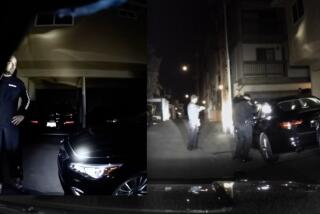Suing Officers for Improper Arrests OKd : Justices Allow Legal Action Even if Policemen Obtained Warrants
WASHINGTON â The Supreme Court ruled Wednesday that police officers may be sued for damages for an improper arrest, even when they have obtained an arrest warrant from a judge.
The justices unanimously refused to give policemen the absolute immunity from suit that they have granted to prosecutors and judges, holding that officers are not protected when they knew or should have known that they lacked enough evidence to support a warrant.
Guideline for Immunity
âDefendants will not be immune if, on an objective basis, it is obvious that no reasonably competent officer would have concluded that a warrantâ should be issued, Justice Byron R. White wrote for the court. âBut, if officers of reasonable competence could disagree on this issue, immunity should be recognized.â
The court rejected the contention that a judgeâs approval of a warrant in itself is sufficient to shield police officers from liability.
âOurs is not an ideal system and it is possible that a magistrate, working under docket pressures, will fail to perform as a magistrate should,â White said. âWe find it reasonable to require the officer applying for the warrant to minimize this danger by exercising reasonable professional judgment.â
Setback for 30 States
The decision was a setback to prosecuting authorities in 30 states, including California, and law enforcement organizations that had urged the justices to protect officers who obtain judicial approval for arrests. They said that officers, unlike magistrates, cannot fairly be expected to determine whether a warrant is being obtained legally.
Wayne Schmidt of Chicago, director of Americans for Effective Law Enforcement, said that the ruling would undermine desirable police policies encouraging officers to obtain court approval for arrests. âNow that an officerâs immunity is eroded, he will have much less incentive to go to a magistrate and get a warrant,â Schmidt said.
But Jack D. Novik of New York, an attorney for the American Civil Liberties Union, said the decision would deter officers from making âpatently groundlessâ applications for warrants. âPolice officers have an obligation to know and apply the Constitution like any other government officials,â Novik said.
The decision allows a former local Chamber of Commerce president from Rhode Island and his wife to proceed with a civil rights suit against a state trooper who obtained a warrant leading to the coupleâs arrest on marijuana charges that later were dropped.
Intercepted Call
The case (Malley vs. Briggs, 84-1596) began in December, 1980, when state policemen making a drug investigation intercepted a telephone conversation in which a caller said he had smoked marijuana at a party in front of âJimmy Briggsâ and passed it to âLouisa.â
On the basis of the conversation, Trooper Edward Malley obtained a warrant from a state judge. In March, 1981, shortly before 6 a.m., officers arrested James R. Briggs, a prominent Narragansett, R.I., real estate developer, and his wife, Louisa, on charges of conspiring to possess marijuana. The arrest of the locally prominent couple was widely publicized.
The charges were subsequently dismissed when a grand jury refused to indict the couple. The Briggses, who never before had been implicated in a criminal investigation, sued Malley and the state, seeking $4 million in damages, contending that the officer violated their constitutional rights by applying for a warrant without âprobable cause.â
Suit Reinstated
A federal trial judge held that neither Malley nor the state could be sued, but an appeals court in Boston reinstated the suit against Malley.
The justices upheld the appellate court, returning the suit for trial. It was not clear to what extent the state may assist Malley, should he be held personally liable. Some states, like California, defend and indemnify officers in such situations.
In a separate opinion, Justice Lewis F. Powell Jr., joined by Justice William H. Rehnquist, agreed that, although police officers are not entitled to absolute immunity, in this instance the case should be dismissed because the couple failed to show that the officer acted unreasonably.
More to Read
Sign up for Essential California
The most important California stories and recommendations in your inbox every morning.
You may occasionally receive promotional content from the Los Angeles Times.










